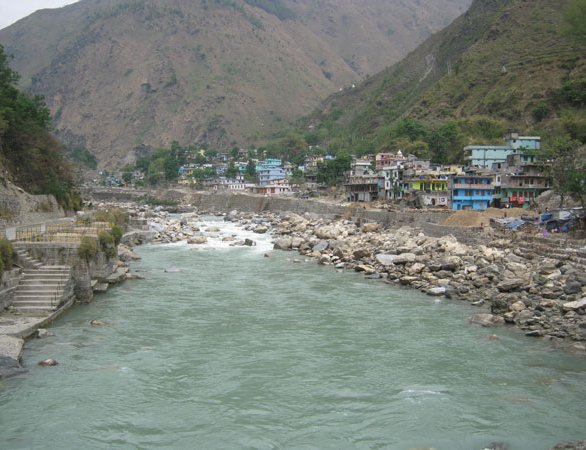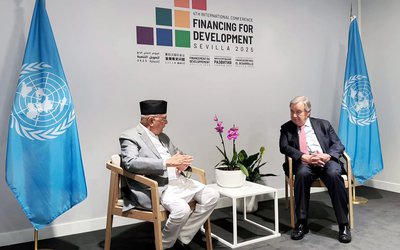
Joy Bahadur Chand, 52, a resident of Baitadi, Patan, crosses the suspension bridge of Jhulagha, the border, at least twice a week to exchange local products with the people living in Pithauragadh of Uttarakhand. He sells honey to India and, in exchange, brings salt, sugar, lentil and other commodities.
“There used to be more harassment from custom officials and border police. There is no more of this, it is relaxed,” said Chand. You cannot close this unique border which has been serving the people living in both the sides for centuries.
Kishan Bohara, 50, a resident of Pithauragadh comes to visit his sister-in-law. His son is married to a girl from Nepal. “Since we have common culture and language, we have marriage and kinship relations,” said Bohara. “We have never realized that the border is any barrier to our relations. Our mind is open as the border is.”
Although so much proximity is seen in the cultural, social, religious and economic aspects of the border among people living near it on both the sides, the intellectual debates and discussions taking place in the capitals of both the countries have rarely make mention of this.
“We have common festivals. People of the other side of the border visit the temple in Nepal’s side. Similarly, we visit the temples and religious shrines in Uttarakhand. The essential commodities are much cheaper in the Indian side of the border,” said Chand. “Our relations are very much based on our own system.”
Like other parts of the border, the people living in Baitadi region have also faced the currency crunch. “We have to buy Indian currency by paying up to Rs. 50 higher than the bank rate. As we cannot officially carry Indian currency of Rs.1,000 and Rs. 500, it is very difficult to search IC Rs.100 and smaller currency. Although we have complained several times with our leaders and officials on this matter, they ignore our difficulty.”
In a recent interaction with Nepalese journalists, Indian envoy to Nepal Jayant Prasad indicated that he would take initiatives to address the currency issue.
Chand complained that the currency matter was alright till it was handled by Nepal Rastra Bank. “The entry of money changer has created the problems for us,” complained Chand.
Intellectual debates hide the unique aspects of the border. “The open border is threatening our own identity. We must introduce an identity card system to regulate the border,” says Buddhi Narayan Shrestha, who has written a number of books on Nepal and India border.
Nepal-India border is open to all. From wildlife to human beings, there is no restriction. The wildlife in national park and sanctuary in the Indian and Nepali sides frequently travel to each other’s areas. As human population has created the settlement that blocked centuries old animal paths, it has increased the conflict between man and animal.
Unlike other countries of the region, Nepal-India border is a natural border. Divided by land, rivers, streams and mountains, there is connection rather than separation. This is the reason it is impossible to man it like other borders.
Although it is divided by Mahakali river and closed minds of elites, it has not made any difference to the people of both the sides to maintain their cultural, religious and economic activities. Chanda and Bohara are two examples of living together with the open border.

Keshab Poudel
Poudel is the editor of New Spotlight Magazine.
- FOURTH PROFESSOR Y.N. KHANAL LECTURE: Nepal-China Relations
- Jun 23, 2025
- Colonel JP CROSS: Centenary Birthday
- Jun 23, 2025
- REEEP-GREEN: Empowering Communities with MEP
- Jun 16, 2025
- BEEN: Retrofitted For Green
- May 28, 2025
- GGGI has been promoting green growth in Nepal for a decade: Dr. Malle Fofana
- May 21, 2025















